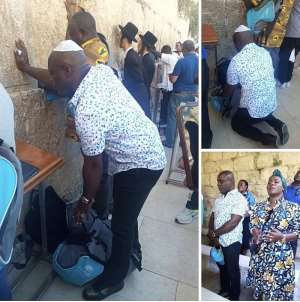
The Role of Religion, Leadership, and Common Sense in Nation-Building: A Critical Reflection on Ghana Under Former President Nana Addo.
The intersection of religion, leadership, and governance has long been a topic of debate in many nations, including Ghana. During the tenure of former President Nana Addo Dankwa Akufo-Addo, a peculiar phenomenon emerged; the sight of Ghanaian Muslims and Christians fervently praying for the nation’s economy. While faith and spirituality are deeply ingrained in Ghanaian culture and provide solace and hope to many, the reliance on prayers to solve systemic issues such as economic instability, corruption, and poor governance raises important questions about the role of religion in nation-building. This reflection argues that while prayers may offer moral and emotional support, they cannot replace the practical actions, competent leadership, and sound policies required to address the challenges facing a nation. The failures of leadership under Nana Addo’s administration, coupled with the misplaced reliance on religious interventions, highlight the need for a more pragmatic and common-sense approach to governance.
The Role of Religion in Ghanaian Society
Ghana is a deeply religious country, with Christianity and Islam being the two dominant faiths. Religion plays a central role in the lives of many Ghanaians, shaping their values, worldview, and sense of community. It is not uncommon for religious leaders to wield significant influence, both spiritually and politically. In times of crisis, Ghanaians often turn to prayer as a means of seeking divine intervention. This was evident during Nana Addo’s presidency, when the economy faced significant challenges, including high inflation, rising public debt, and a depreciating currency. Many citizens, both Muslims and Christians, organized prayer sessions, fasting, and intercessory services, asking God to intervene and restore the nation’s economic fortunes.
While these acts of faith are commendable and reflect the resilience and hope of the Ghanaian people, they also reveal a troubling trend: the tendency to rely on spiritual solutions for problems that require practical, tangible actions. Prayers, no matter how fervent, cannot fix a nation’s economy, eradicate corruption, or replace the need for competent leadership. The challenges facing Ghana during Nana Addo’s administration were not spiritual in nature; they were the result of poor policy choices, mismanagement, and a lack of accountability.
The Limitations of Prayers in Addressing Economic and Governance Issues
The belief that prayers alone can solve national problems is not only misguided but also dangerous. It shifts the responsibility for addressing critical issues from leaders and citizens to a higher power, absolving those in positions of authority from accountability. For example, Ghana’s economic challenges under Nana Addo were largely the result of unsustainable borrowing, mismanagement of resources, and a failure to implement effective policies to stimulate growth and create jobs. No amount of prayer could reverse these structural issues without concrete actions such as fiscal discipline, investment in infrastructure, and the promotion of local industries.
Similarly, corruption, which has been a persistent problem in Ghana, cannot be eradicated through prayers alone. Corruption is a systemic issue that requires strong institutions, transparency, and the enforcement of laws. While religious leaders can play a role in advocating for ethical behavior and moral integrity, the fight against corruption ultimately depends on the willingness of leaders to lead by example and the commitment of citizens to hold them accountable.
The Importance of Competent Leadership
The failures of Nana Addo’s administration underscore the importance of competent leadership in nation-building. Leadership is not about rhetoric or charisma; it is about making informed decisions, prioritizing the needs of the people, and implementing policies that promote sustainable development. Unfortunately, under Nana Addo, Ghana experienced a leadership deficit characterized by poor economic management, nepotism, and a lack of vision.
One of the most glaring examples of this leadership failure was the handling of the economy. Despite promises to transform Ghana into a prosperous nation, the administration’s policies led to a ballooning public debt, rising inflation, and a decline in living standards. The government’s reliance on external borrowing to finance infrastructure projects, coupled with a lack of transparency in the use of funds, exacerbated the economic crisis. Instead of addressing these issues through sound economic policies, the administration seemed to rely on the hope that divine intervention would solve the problem.
The Need for Expertise and Common Sense in Governance
One of the most striking aspects of the reliance on prayers during Nana Addo’s presidency was the apparent disregard for expertise and common sense in governance. Nation-building is a complex process that requires the skills and knowledge of professionals in various fields. For example, fixing roads requires engineers, not religious scholars. Interpreting the constitution requires lawyers, not imams or pastors. Prescribing medication requires chemists and medical professionals, not faith healers. These are basic principles of common sense that seem to have been overlooked in the quest for spiritual solutions.
The failure to prioritize expertise in governance was evident in many areas under Nana Addo’s administration. For instance, the appointment of individuals to key positions based on political loyalty rather than merit led to inefficiency and mismanagement. This lack of professionalism not only undermined the effectiveness of government institutions but also eroded public trust in the administration.
The sight of Ghanaian Muslims and Christians praying for the nation’s economy during Nana Addo’s presidency is a testament to the deep faith and resilience of the Ghanaian people. However, it also highlights the limitations of relying on spiritual solutions for problems that require practical actions and competent leadership. Prayers cannot fix a nation’s economy, eradicate corruption, or replace the need for sound policies and good governance. The failures of Nana Addo’s administration underscore the importance of expertise, accountability, and common sense in nation-building. As Ghana moves forward, it is essential for both leaders and citizens to recognize that while faith may provide hope and inspiration, it is through hard work, informed decision-making, and collective action that the nation’s challenges can be overcome.
Sulley Kone
+233244805619


